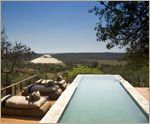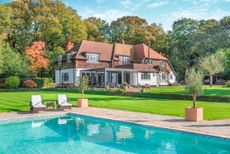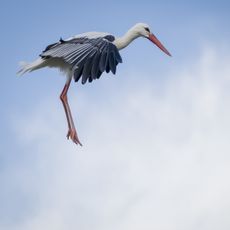Safari homes in Africa
Safari lodges in South Africa are redefining the market for second homes with a difference, says Liz Rowlinson, who visits Tara Getty’s new homesteads


Nosy neighbours can prove quite a nuisance, but in the African bush, an inquisitive giraffe walking past your window or an elephant drinking from the pool is quite a different proposition. Such occurrences are among the highlights of owning a property in the bushveldt one of the latest additions to the options for those hankering after a second home a million miles from the rat race.
Just as safari camps have long since upgraded from simple canvas tents and narrow camp beds, reminiscent of the scene in which Finch Hatton woos Baroness von Blixen in Out of Africa, bush lodges are now dressed with power showers, fine dining and Bose speakers. In effect, it is now possible to sleep deeply in the African wilderness without sacrificing a single creature comfort. Such a belief is behind the 40 luxury reserves managed by & a leading eco-tourism operator (formerly known as CC Africa) where guests can enjoy eco-lodges in prime game areas.
It was in response to requests from guests that &BEYO ND is now selling private lodges to individuals at one of its reserves in northern KwaZulu-Natal, South Africa. ‘There are always people who want to have something of their own, and the demand for wildlife properties is growing,’ says Steve Fitzgerald, chief executive of &BEYO ND. ‘Some people try to do it on their own, but it’s fraught with difficulties, such as problems with title when buying the land or day-to-day issues such as hyenas eating the tyres on the 4x4.’
Hence the idea for African Homesteads as a one-stop, hassle-free safari home was born, and it’s currently selling 15 homes on a 72-year lease, with owners having access to 57,000 acres of pristine Big Five game wilderness (www.africanhomesteads. com). The Phinda Private Game Reserve accessed by either an 80-minute flight from Johannesburg or anhour flight from Durban to its own airfield is indeed rich in game, especially the coveted Big Five: lion, leopard, elephant, buffalo and rhino.
The fact that they roam in the vicinity is estimated to quadruple the value of land, and the pricing of the lodges ranging from ZAR51 million (£3.7 million) reflects this. Sweeping through scrubby plains of acacia and giant aloe, you might come across two prides of lions, some rare white rhino, a female cheetah guarding half a dozen lively cubs, as well as crocodiles, hippos and buffalos brought back from virtual extinction. Such abundance is due to a decade of ambitious game re-stocking at Phinda which means ‘the return’ in Zulu but also because it has seven different ecosystems (the Kruger National Park only has five).
Within a morning, you can traverse riverine plain, marsh, sand forest, mountain and the lush waterways of the World Heritage St Lucia wetlands and even go scuba diving in the Indian Ocean. Birders will also find it fertile ground, with 400 different species. Lodges will be located in secluded spots on four sites there are six commercial lodges already, including Getty House, owned by Tara Getty (son of the late philanthropist Sir John Paul Getty), whose family owns 30% of Phinda’s land.
With a large deck sweeping around it, each lodge will have four en-suite bedrooms, plus a fifth for nanny/staff under a traditional thatchand-timber roof. One lodge has been designed around a central weeping boerbean tree, and also with bush architectural vernacular in mind most come with a boma: a circular dining area around a fire. Each lodge covers 6,000sq ft of living space, and outdoor features include infinity pools, lily ponds and private showers. You can use your own interior designer if you don’t like the styling an avant-garde take on the ethnic but all lodges come fully furnished down to the last teaspoon.
Sign up for the Country Life Newsletter
Exquisite houses, the beauty of Nature, and how to get the most from your life, straight to your inbox.
At ZAR1.2 million (£86,700) a year, service charges are hefty, but cover eight staff for each home, including a ranger, butler, chef, and security guard, plus insurance, running costs and a 4x4 safari vehicle. There isn’t going to be a rental scheme at Phinda for the private lodges. Regional director Kevin Pretorius believes that too much commercial activity is bad for the environment, and that owners would rather maintain its exclusivity. He reports that there are no owners yet, but there are several interested parties, mainly British and American. With the Rand being one currency that the pound is strong against, British interest hasn’t been extinguished. ‘We are the first company in Africa to develop such a high-quality yet low-impact model, and I don’t know of any other site on such prime game land with so few properties on such a large plot,’ Mr Pretorius says.
Most of the opportunities to invest in game reserves in southern Africa are based on time-share or fractional schemes, which suit those who are only likely to visit two or three times a year. So you don’t have to be rich to own one these days, according to Jeff Watts of the eLan Group (www.elan.co.za), a developer of eco-estates also based in KwaZulu-Natal which offers fractions from ZAR35,000 (£2,500). ‘It’s no longer just about the rich man who jets in to see the Big Five and then has a brandy and a large cigar. Middle-of-the-road opportunities are opening up, and we’re seeing purchasers buy several plots, for about ZAR895,000 (£64,700) and then seek shareholders.’ Game reserves are highly sought after, but sales are conducted privately, rather than advertised, according to Aylesford International (www.aylesford.com).
Country Life is unlike any other magazine: the only glossy weekly on the newsstand and the only magazine that has been guest-edited by HRH The King not once, but twice. It is a celebration of modern rural life and all its diverse joys and pleasures — that was first published in Queen Victoria's Diamond Jubilee year. Our eclectic mixture of witty and informative content — from the most up-to-date property news and commentary and a coveted glimpse inside some of the UK's best houses and gardens, to gardening, the arts and interior design, written by experts in their field — still cannot be found in print or online, anywhere else.
-
 A well-connected rural playground with 23 acres on the edge of the South Downs National Park
A well-connected rural playground with 23 acres on the edge of the South Downs National ParkOld House Farm is an impressive family home with a wealth of amenities that would inspire any rural passion.
By Arabella Youens Published
-
 The UK gets its first ‘European stork village’ — and it's in West Sussex
The UK gets its first ‘European stork village’ — and it's in West SussexAlthough the mortality rate among white storks can be up to 90%, the future looks rosy for breeding pairs in southern England.
By Rosie Paterson Published

